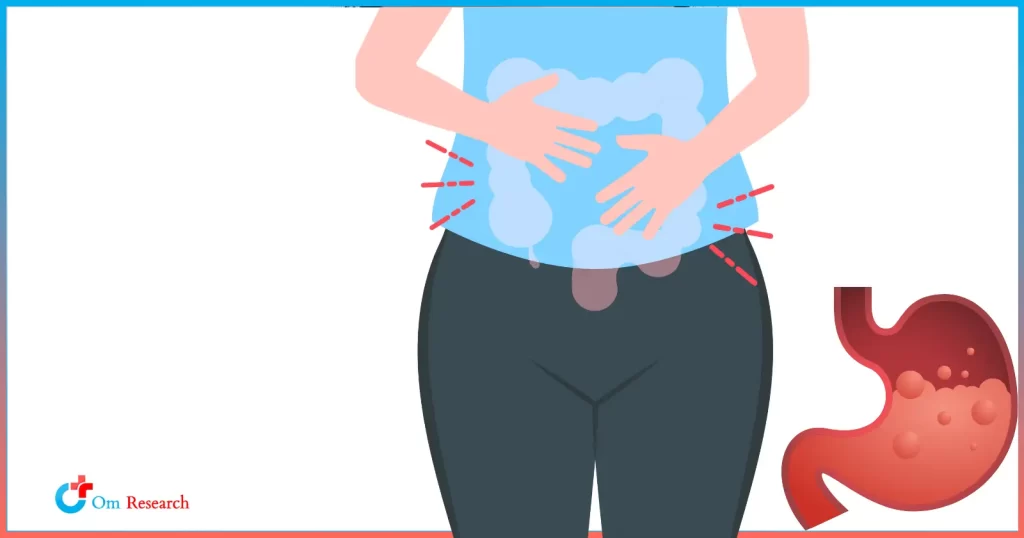Ozanimod is approved for ulcerative colitis (UC) and multiple sclerosis (MS) in multiple countries including the United States (US) by the Food and Drug Administration (FDA), Canada, the European Union, and the United Kingdom (UK), and is available by prescription for the treatment of UC in many of these countries.
It is given as a capsule orally (by mouth). Ozanimod is now being further tested to observe its effectiveness and safety in people with UC. Also, its tolerability, long-term durability of response and effects on quality of life (QoL), biomarkers in people with UC are being tested.
Key Points
- Approved for UC in adults by the FDA and other regulatory bodies.
- Taken orally as a capsule.
- Reduces inflammation in the gut to manage UC symptoms.
- Ongoing studies are evaluating long-term effects and impact on quality of life.
Risks from Ozanimod
The study drug, ozanimod, has been approved for the treatment of multiple sclerosis (MS), and ulcerative colitis (UC).
It is also being currently studied for Crohn’s disease (CD).
What is Multiple Sclerosis
MS is a chronic disease that can affect a person’s brain, spinal cord, and the optic nerves in the eyes. It can cause problems with vision, balance, muscle control, and other basic body functions.
What is UC
Ulcerative Colitis are chronic inflammatory disorders of the bowels that can cause diarrhea, rectal bleeding, weight loss, abdominal pain, and fever.
What is CD
Crohn’s Disease is a chronic inflammatory disorder of the bowels. People with CD often suffer from diarrhea, abdominal pain, rectal bleeding, weight loss, and fever.
As of 21 Nov 2021, about 5,585 subjects have received ozanimod in human studies. There is always a risk involved in taking any drug, but you will be carefully watched for any side effects.
There may be risks or side effects that are unknown or cannot be foreseen at this time. You are encouraged to report anything that is bothering you to your study doctor or study nurse.
You may ask your study doctor at any time for more information about side effects and other possible risks. Your study doctor may give you medicines to help lessen the side effects. Your study doctor may adjust ozanimod dose size to try to reduce side effects.
Some side effects go away soon after you stop taking ozanimod.
In some cases, side effects can be serious and long lasting. Sometimes they never go away or may cause death.
All drugs have a risk of an allergic reaction. In some cases, the reaction could be life-threatening if not treated quickly.
Seek immediate medical help if you have any of the following signs of a serious allergic reaction: trouble breathing or swelling of the face, mouth, lips, gums, tongue, or neck.
Other allergic reactions may include rash, hives, or blisters. Tell your study doctor as soon as possible if any of these reactions happen.
Because this study drug works by reducing the number of certain cells in your body’s immune system called lymphocytes, you may have an increased risk for infections or cancers.
Ozanimod study treatment may cause vaccines to be less effective. Tell your study doctor right away if you get sick or have an infection.
The side effects associated with ozanimod study treatment are listed below.
Very common (occurring in at least 1 out of 10 people):
- Common cold, runny nose, and sore throat (nasopharyngitis)
- Reduced blood lymphocyte count (a type of white blood cell that fights infection; lymphopenia), which increases the risk of certain types of infection
Common (occurring in at least 1 out of 100 and less than 1 out of 10 people):
- Viral Respiratory tract infection
- Pharyngitis (sore throat)
- Urinary tract infection (infection of your kidneys, urinary tract, or bladder)
- Headache
- Swelling of the legs or hands (peripheral edema)
- Elevations in liver enzymes, abnormal liver function test (changes in your liver functioning; alanine aminotransferase increased, gamma-glutamyl transferase increased)
- Elevation in blood bilirubin level (associated with jaundice)
- High blood pressure (hypertension)
- Painful rash known as shingles (herpes zoster)
- Herpes infection (a viral infection; herpes simplex, cold sores)
- Slowing of heart rate (bradycardia)
- Blood pressure decrease on standing (orthostatic hypotension)
- Breathing test results altered (PFT abnormal)
Uncommon (occurring in at least 1 out of 1,000 and less than 1 out of 100 people):
- Allergic reactions, including skin rash or hives (hypersensitivity; including rash, and urticaria)
- Macular edema (fluid build-up at the back of the eye that may distort vision; macular edema)
Rare (occurring in at least 1 out of 10,000 and less than 1 out of 1,000 people)
- Progressive multifocal leukoencephalopathy is a rare viral disease of the brain caused by inflammation and damage which can cause severe disability or death. It is important that you tell your study doctor right away if you have any new or worsening medical or neurologic problems that last for several days. This can include weakness on one side of the body, clumsiness of the arms and legs, vision problems, speech difficulty, and changes in thinking, memory, and orientation leading to confusion and personality changes
Other conditions have been observed but it is not known if they are caused by ozanimod.
- A case of paralysis with temporary coma in 1 subject in a multiple sclerosis study (Guillain-Barre Syndrome, Posterior Reversible Encephalopathy Syndrome [PRES]). PRES is a medical condition of the brain with symptoms of severe headache, confusion, seizures, and vision loss. Tell your study doctor right away if you experience these symptoms. The symptoms of PRES are usually reversible but may lead to blocked blood flow in the brain (ischemic stroke) or bleeding in the brain (cerebral hemorrhage)
- Cancers (including breast and skin cancers – uncommon)
- One case of lymphoproliferative disorder (LPD, an uncontrolled growth of white blood cells associated with a virus) was reported in a subject in an ulcerative colitis study
In addition, the following side effects have been seen with other medications that work in a similar way to ozanimod:
- Very rare fatal cases of chicken pox in subjects with multiple sclerosis treated with other drugs that work like ozanimod in combination with high-dose steroids for treatment of a multiple sclerosis relapse
- Fungal infections (sometimes serious) were seen with other medications that work like ozanimod
- Reducing how well the immune system works might increase the risk of cancer. The study doctor will exam your skin during the study to monitor for skin cancer. You should also minimize sun exposure, use appropriate sun protection, and monitor your skin for any changes. Tell the study doctor or study staff if you have any concerns or skin changes
- Worsening of multiple sclerosis that was severe after stopping drugs that work like ozanimod (disease rebound)
Additional risks that your study doctor would like you to know about include:
Please ask the study doctor or study staff if you have questions about the signs or symptoms of any side effects that you read about in this informed consent form.
If you suffer from any of these side effects (or any others not listed) or you think you are experiencing a side effect, during this study, please inform your study doctor immediately (see “Whom to contact about this study”).
Any side effects or other health issues occurring during the study will be followed up by the study doctors.
Are there any reproductive risks?
The risks to an unborn child or nursing child from ozanimod are not known at this time. Ozanimod should not be taken by pregnant or nursing women.
Studies in animals have shown that ozanimod can harm an unborn child, and it is possible the study treatment may harm a nursing child or cause a miscarriage.
If you are a woman
If you are pregnant, planning to become pregnant, or you are nursing a baby, you should not take part in this study. The study doctor will discuss effective birth control methods with you if you are able to become pregnant. This is to make sure that you do not become pregnant while in the study.
Your chosen form of birth control must be effective by the time you receive your first dose of ozanimod. For example, birth control pills should be started at least 28 days before your first dose of study drug.
If you can become pregnant:
- You will have to repeat pregnancy tests during the study
- You must avoid any sexual activity that may lead to pregnancy (for example, you must use effective contraception if you are sexually active)
- You must use one of the approved options for birth control while taking the study drug and for at least 90 days after your last dose of study drug
Approved options are any one of the following highly effective birth control methods:
- Hormonal contraception (for example, birth control pills, intravaginal ring, transdermal patch, injection, implant)
- Intrauterine device
- Tubal ligation (tying your tubes)
- A partner with a vasectomy
- Completely avoiding sexual intercourse
Certain other drugs may reduce the effectiveness of hormonal birth control methods during and up to 30 days after discontinuation of these concurrent study treatments.
Please talk to your study doctor for further information about birth control methods.
You must inform the study doctor, if at any time during the study:
- Your birth control method changes
- You experience a problem with your current birth control method
If your ability to become pregnant changes (for example, you have an intrauterine device removed, accidently miss taking any of your birth control pills, or enter menopause), you must inform and discuss with the study doctor or study nurse about other birth control methods.
If you suspect that you have become pregnant during the study or within 90 days of the last dose of study drug, you must tell the study doctor right away. Your study doctor must then require you to stop taking ozanimod. Your study doctor will want to check on you during the pregnancy and ask you questions about the pregnancy.
If you become pregnant during the study, your study doctor will ask to collect the following information:
- Your pregnancy outcome, including spontaneous or voluntary termination
- Details of the birth (full-term, premature, or involves complications)
- Presence or absence of any birth defects, abnormalities, or complications, and the health status of your child
When you sign and date this consent, you are agreeing to provide this information about you and your child if you become pregnant during study treatment or up to 90 days after study treatment discontinuation. This may be collected from your medical records.
You are always free to withdraw your consent to take part in this or any study procedures.
If you are a man
If your partner becomes pregnant while you are in the study, your study doctor will ask your partner to sign and date a separate consent to permit the collection of information on the pregnancy, your baby’s health status at birth and possibly up to a year after the birth.
If you have UC and are interested in Ozanimod, consult with our study doctors by contacting us.
- Ozanimod may cause side effects, so consulting a healthcare professional is crucial.
- It’s not recommended for pregnant or breastfeeding women due to potential risks.
- More research is needed to determine its complete safety profile for UC patients.
Conclusion
Ozanimod is a medication recently approved for treating moderately to severely active ulcerative colitis (UC) in adults. It works by regulating the immune system to reduce inflammation in the gut. While initial studies show promise, Ozanimod is undergoing further investigation to assess its long-term effectiveness, safety, and tolerability in UC patients.



